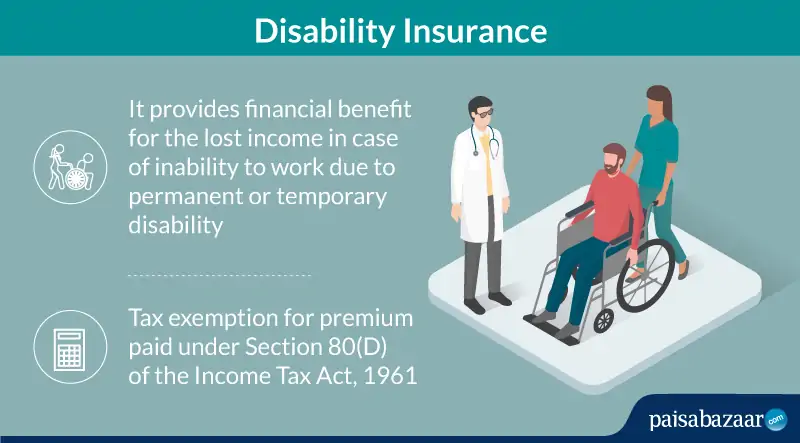Disability insurance is one of the most overlooked—yet most critical—types of financial protection. If an illness or injury prevents you from working, disability insurance replaces a portion of your income, ensuring you can still pay your bills and maintain your lifestyle.
In this comprehensive guide, we’ll explore the key benefits of disability insurance and why it should be part of your financial safety net.
1. Income Replacement When You Can’t Work
Your ability to earn an income is your most valuable financial asset. Disability insurance provides a safety net if you become unable to work due to:
✅ Short-term disabilities (e.g., recovery from surgery, severe illness)
✅ Long-term disabilities (e.g., chronic conditions, permanent injuries)
How It Works:
- Pays a percentage of your salary (typically 50-70%)
- Short-term disability (STD): Covers 3-6 months
- Long-term disability (LTD): Covers years or until retirement
2. Protection Against the Unexpected
Many people assume disabilities only result from accidents, but illnesses cause most long-term disabilities. Common conditions include:
- Cancer
- Heart disease
- Back injuries
- Arthritis
- Mental health disorders
Disability insurance ensures you’re covered whether the cause is an accident or illness.
3. Covers Living Expenses & Financial Obligations
Without income, everyday expenses can become unmanageable. Disability insurance helps cover:
✔ Mortgage/rent
✔ Utilities & groceries
✔ Medical bills
✔ Loan payments (student loans, car payments)
✔ Childcare & education costs
4. Employer Plans May Not Be Enough
Many employers offer disability insurance, but coverage is often limited:
❌ Short benefit periods (e.g., only 3-6 months)
❌ Low payout percentages (e.g., 40-60% of salary)
❌ Not portable (lose coverage if you change jobs)
Individual disability insurance fills these gaps with customizable, long-term protection.
5. Own-Occupation vs. Any-Occupation Coverage
Not all disability policies are the same. The best policies use “own-occupation”definition:
✅ Own-Occupation: Pays if you can’t work in your specific profession (e.g., a surgeon who can’t operate but could teach)
❌ Any-Occupation: Only pays if you can’t work any job (much harder to qualify)
6. Financial Security for High-Risk Professions
Some jobs (e.g., construction, healthcare, law enforcement) have higher injury risks. Disability insurance is especially crucial for:
- Surgeons & dentists (protecting hands & fine motor skills)
- Tradespeople (back injuries, falls)
- Athletes (career-ending injuries)
7. Protects Retirement Savings
Without disability insurance, you might drain your savings or retirement funds to survive. A good policy prevents:
⚠ Early 401(k) withdrawals (with penalties)
⚠ Depleting emergency funds
⚠ Going into debt
8. Tax-Free Benefits (If You Pay Premiums)
- Employer-paid premiums → Benefits are taxable
- Self-paid premiums → Benefits are tax-free
This makes individual policies more valuable in the long run.
9. Waiting Periods & Benefit Periods
Disability insurance has two key timing factors:
⏳ Elimination period (waiting time before benefits start—e.g., 30, 60, or 90 days)
📅 Benefit period (how long payments last—e.g., 2 years, 5 years, or until retirement)
Pro Tip: A longer elimination period lowers premiums.
10. Combines with Other Insurance for Full Protection
Disability insurance works alongside:
- Health insurance (covers medical bills)
- Life insurance (protects family if you pass away)
- Emergency fund (covers short-term gaps)
Who Needs Disability Insurance?
✔ Breadwinners (families depend on your income)
✔ Self-employed professionals (no employer safety net)
✔ High-income earners (harder to replace salary)
✔ Single adults (no spouse to rely on)
✔ People with dependents (mortgage, kids’ education)
Is Disability Insurance Worth It?
✅ YES, if:
- You rely on your paycheck to live
- You have debt or financial obligations
- Your employer’s coverage is weak
- You work in a high-risk job
❌ Maybe not if:
- You have enough passive income to live without working
- You’re near retirement with substantial savings
Final Thoughts: Don’t Risk Your Financial Future
Disability insurance is like a seatbelt—you hope you never need it, but you’ll be grateful it’s there if disaster strikes. A single accident or illness could derail your finances without this protection.
If you don’t have coverage, speak with an insurance agent today to find a policy that fits your needs and budget.
